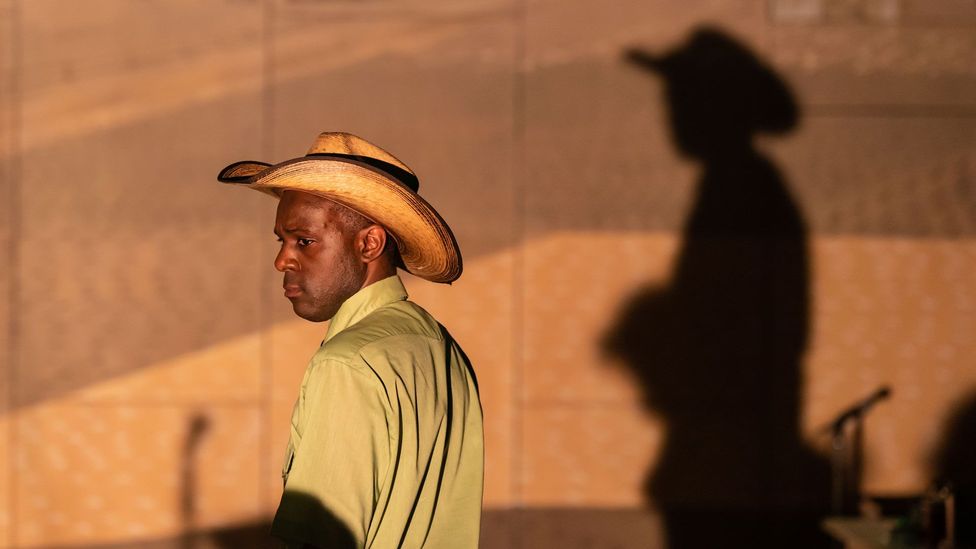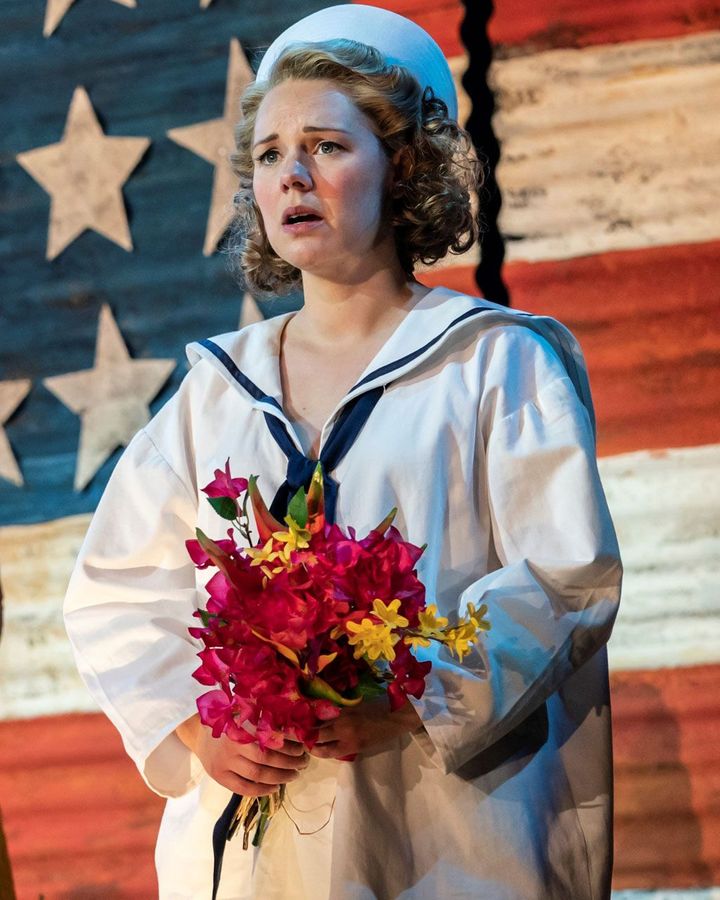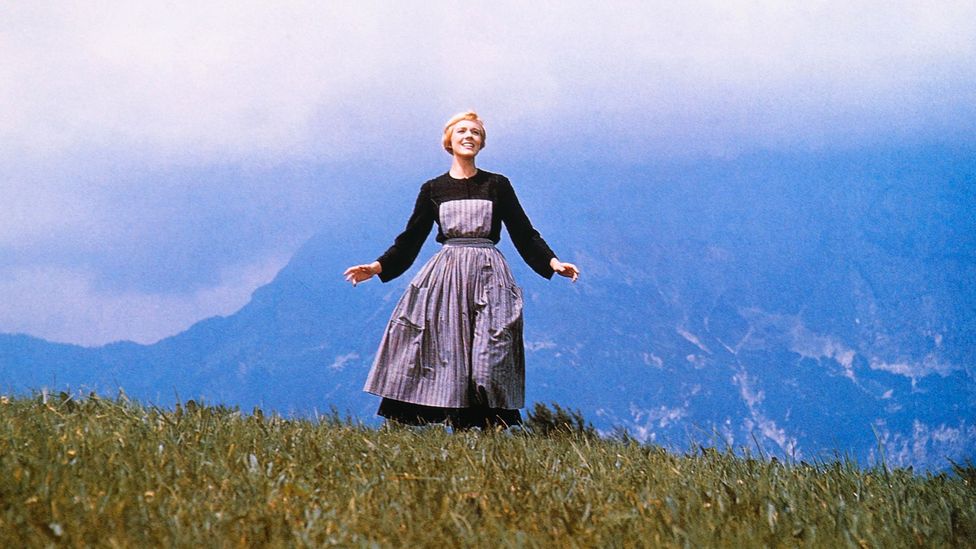The sex and death in a cosy US classic

Time can have a dulling quality. Such has been the effect on Rodgers and Hammerstein’s Oklahoma!, which in the 1940s revolutionised the Broadway musical as a form – it is often described as being as much of a game-changer in its day as Lin-Manuel Miranda’s Hamilton. But the passing years have rendered it, in many people’s eyes, familiar, folksy and cosy.
More like this:
– Literature’s most misunderstood villain
– A new Golden Age of movie musicals
– The playwright who foresaw the Trump era
However just recently, a radical new version of the show has helped to change that perception. US director Daniel Fish’s stripped-back staging, with its bluegrass reorchestrations, interval chilli, sudden plunges into pitch-black and undercurrents of violence, made US audiences look afresh at the material when it opened on Broadway in 2019, winning the Tony Award for best revival. It brought out the darkness in the central love triangle between farm girl Laurey and her two suitors, cowboy Curly McLain and farmhand Jud Fry, and other things too; audiences started referring to it as “sexy Oklahoma!”. Now the New York hit has crossed the Atlantic to London’s Young Vic, with a cast including Doctor Who’s Arthur Darvill and Marisha Wallace, star of Dreamgirls and Waitress in the West End.

A hit on Broadway, now playing at London’s Young Vic, Daniel Fish’s production of Oklahoma! unearths its darkness (Credit: Marc Brenner)
Oklahoma! was Richard Rodgers and Oscar Hammerstein’s first musical as writing partners, though the pair would go on to write seminal Great American Musicals like South Pacific, Carousel and The Sound of Music. Based on Lynn Rigg’s 1930 play Green Grow the Lilacs, it opened in 1943 and was a phenomenal success. It ran for an unprecedented 2,122 performances – far ahead of the previous Broadway record holder – and won a special honorary Pulitzer. Set in 1906 in the region then known as Oklahoma Territory, Oklahoma! chronicles the characters’ rival courtships but it’s also about life in a young country and, for a wartime audience, it symbolised the things people were fighting for – hope, home and possibility.
Oklahoma! Is very deeply embedded in US culture. The title song is now the state song of Oklahoma and references to Oklahoma! have rippled through other artworks like HBO’s recent Watchmen miniseries, based on the Alan Moore and Dave Gibbons’ comic books, and the Charlie Kaufman film I’m Thinking of Ending Things. But as Patrick Vaill, who has played Jud Fry in all the iterations of Fish’s production since it started life at New York’s Bard College in 2007, explains, Fish wanted to “stage it as if people in the future had discovered the script in a time capsule and were looking at it as if for the first time.”
A cautionary tale about community
This approach allowed Fish to pare the musical back to its bones and unearth the violence and injustice already present in the material. He also offers the reminder that while the show “holds a familiar place to a great many people. I think there’s a huge portion of America, for whom it holds no place and is totally strange to them,” he tells BBC Culture.
To Fish, Oklahoma! is a show about “how a community is only a community by virtue of who is outside it.” Fry, the lonely farmhand who develops an obsession with Laurey, occupies this role. “He is the person upon whom everyone else projects their fear, their prejudice, their classism,” says Vaill. People talk about him as a threat: they cast him in that role. On stage Vaill draws out the character’s vulnerability but also his unnerving sense of entitlement to Laurey’s affections, all of which pours forth in the song In a Lonely Room – a song, Vaill says, that was ahead of its time in the way it allows the audience access to the character’s mind – with Jud finally determining that “I ain’t gonna leave her alone!”
Oklahoma! is also about what constitutes justice in the US. After Jud dies in a knife fight with Curly, a makeshift trial is held and Curly is quickly declared not guilty. It’s a show, says Fish, in which “a heterosexual couple’s wedding night is so important that justice must be sacrificed.” On this sacrifice is built not just a marriage – the smallest social unit – but “a town, a community, a state, arguably a nation.”

Rodgers and Hammerstein’s decision to make South Pacific’s female lead Nellie Forbush a racist was a particularly powerful one at the time (Credit: Johan Persson)
A lot of the conversation surrounding Fish’s production in the US concentrated on its carnality, on the heat generated between the performers. But again, he was drawing from the source. Oklahoma!, he says, is a show with “sex and death at the heart of it”. Vaill agrees. “Rodgers and Hammerstein were sexy people,” he says. “Carousel has complicated sexuality and South Pacific, that’s some hot stuff. They were hip to the idea that people have desires. This play, it’s entirely about sex.” As Ben Brantley put it in his New York Times review, one of Rodgers and Hammerstein’s many innovations was the way they “captured the untapped hormonal energy in a land where there’s a dangerous sense of making up your rules as you go along”. Trevor Nunn’s 1998 production for London’s National Theatre, which featured a star-making turn by Hugh Jackman as Curly, also had critics commenting on its “erotic currents“. Oklahoma! is a show rich and robust enough to weather multiple re-imaginings: there have been LGBTQ-focused productions and an all-African-American production in Denver in 2018 – though there’s yet to be a major West End or Broadway production directed by a woman.
However, while Rodgers and Hammerstein wrote formally innovative shows that grappled with the social issues of the day, a lot of the attitudes on display can feel dated. Their 1949 hit South Pacific, about US soldiers stationed in the Pacific islands, directly addresses racial prejudice. But it also contains jarringly dated racial stereotyping – particularly the character of Bloody Mary, the local Tonkinese entrepreneur. Daniel Evans, artistic director of Chichester Festival Theatre in the UK, was very aware of this tension when he chose to stage it last year, in a production that transfers to London’s Sadler’s Wells this summer. Evans – who also directed Oklahoma! in 2018 – believes South Pacific is a show that, at heart, is “asking how can we all get on? How can we all cohabitate? On this small island that’s representative of our planet.”
The cleverness of the show, he explains, lies particularly in the trajectory of female lead Nellie Forbush, an American nurse who begins a romance with local estate owner Emile de Becque, only to break things off when she finds out he has two mixed-race children. “You fall in love with this young woman who is a fun, down-to-earth, generous person only to find at the end of Act One that she’s a racist,” as Evans says.
In order to address some of the show’s more dated aspects, Evans had to disrupt the audience’s expectations of certain scenes and songs. This was most overt in the number Happy Talk, which is sung by Bloody Mary. It’s a song, says Evans, about a mother desperately trying to pair her daughter off with an American GI in order that she could have a better life, so the chirpy tone of the song feels inappropriate. His solution was to reorchestrate that number, so it was “more true to the situation”.
A progressive duo
For all these now-problematic moments, however, Evans stresses Rodgers and Hammerstein’s liberal sensibilities – Hammerstein co-founded the Hollywood Anti-Nazi League – which were as central to who they were as artists as their songwriting prowess.
Director Bartlett Sher, who won a Tony for his 2008 production of South Pacific at New York’s Lincoln Center, echoes this point. The musical, he explains, was written at a time not long after World War One, when “all the questions about race were hugely present in the culture in the United States”. The first platform on racism had just been held at the Democratic National Convention, so these two “good liberal Jews from New York” made race central to the text, interrogating and challenging these attitudes via Forbush’s inherent racism. The song You’ve Got to be Carefully Taught, which argues that racism is learned behaviour, is the most overt example of this. It was, says Sher, “a very powerful song at the time that nobody [else] would have ever thought of putting into a traditional musical”. They had to fight to keep the song in the show, he points out.

Even Rodgers and Hammerstein’s family classic The Sound of Music takes place against the backdrop of Nazism in Europe (Credit: Alamy)
Before Sher’s production there had been no major revivals of South Pacific in the US. He went back to Hammerstein’s original book and restored some of the lines that had been cut, many of which were to do with race. Everything was there in the text, he says. “We’re lucky when we do them now that we can now engage with the questions again.”
In 2015, Sher went on to helm a production of The King and I, Rodgers and Hammerstein’s 1951 musical exploring the struggle for understanding across the cultural divide between East and West via a story about a British governess hired to work for the King of Siam. It’s a show that sets out to address the subject of colonialism, but while it was progressive in its time, its storyline can feel decidedly regressive to modern audiences, with its white saviour heroine. Sher’s staging, which netted him another Tony, avoided some of the exoticism associated with the show and featured a mostly Asian cast including Ken Watanabe as the King. But the reason the material holds up, says Sher, is because “they had this remarkable ability to ask these questions at the time. Do they ask it as perfectly as we might do it now? No, they probably don’t. But they’re at least trying.” Even The Sound of Music, he adds, takes place against the backdrop of rising Nazism in Europe.
Of all the duo’s works, Carousel, written in 1945 and inspired by a 1909 Hungarian play called Lilliom, is the one that feels most jarring to contemporary audiences, with its depiction of domestic abuse. It tells the story of a man, carnival barker Billy Bigelow, who ascends to heaven after dying in a robbery attempt, before being allowed back to Earth for one day: but Billy is a violent man who, when interrogated in the afterlife, denies his treatment of his wife Julie by saying: “I wouldn’t beat a little thing like that — I hit her.” For Timothy Sheader, who directed Carousel at the Open Air Theatre in London’s Regents Park last year, the only option was to tackle the violence head-on. His version relocated the musical to a working-class town in the north of England and reorchestrated the score for brass instruments. Crucially, it did not tiptoe around Bigelow’s abusiveness and when he dies, it does not let him off the hook. Sheader replaced the God-like Starkeeper figure who Billy encounters in the afterlife with a courtroom of women holding 6-ft carousel poles, which they use to surround him.
The resulting production, according to Time Out’s Andrzej Lukowski, didn’t “so much reinvent ‘Carousel’ as blowtorch away three-quarters-of-a-century of chintz to reveal the greatness underneath. It preserves everything that’s wonderful about the show, while ruthlessly incinerating much that dates and problematises it.”
Sheader thinks it’s important to remember that “these two middle-class men were writing about male violence in a musical on Broadway in the 1940s. The way they treated the subject matter may be quite different to how we would treat that subject matter if we were writing about it right now, but they addressed it.” At the same time, reinvention and interrogation of the material is essential, says Sheader, if the shows are to continue to have relevance – and continue to be performed at all. Though the Rodgers and Hammerstein estate took some convincing of his concept to begin with, they were open to his approach – a decision founded on a degree of pragmatism, he believes, since “I don’t think those titles have very much longer in their original form.”
After Oklahoma! opened, Lorenz Hart – Rodgers’ former writing partner – came up to the duo in the Broadway hangout Sardi’s and congratulated them on a show that would last 20 years. He was over half-a-century out and counting, which is testament to their complexity and their ability to speak to us today.
Oklahoma! is at London’s Young Vic until 25 June
If you would like to comment on this story or anything else you have seen on BBC Culture, head over to our Facebook page or message us on Twitter.
And if you liked this story, sign up for the weekly bbc.com features newsletter, called The Essential List. A handpicked selection of stories from BBC Future, Culture, Worklife and Travel, delivered to your inbox every Friday.








